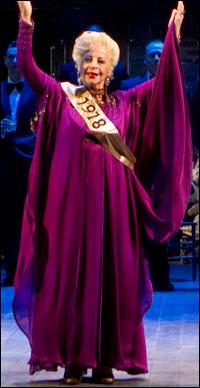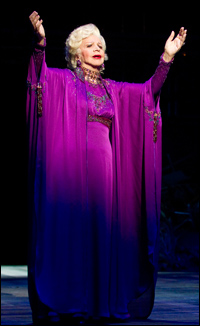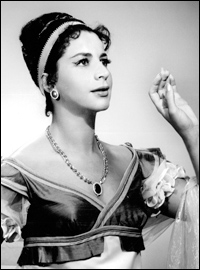
*
Mezzo-soprano Rosalind Elias is making her Broadway debut — as Heidi Schiller in Stephen Sondheim and James Goldman's Follies — at the age of 82. Her big break playing a former revue star from the Weismann Follies of 1918, in the conceptual musical now at the Marquis, comes on the heels of an operatic career than spanned more than 50 years and included over 600 performances at the Metropolitan Opera, where she created the roles of Erika in Samuel Barber's Vanessa and Charmian in Barber's Antony and Cleopatra.
A Beiruti from Lebanon, Elias was the youngest of 13 children and had heard radio broadcasts of the Met growing up; persistent in her desire to study voice, Elias did so in her early teens, ultimately attending New England Conservatory. Elias spoke by phone on Sept. 29 before her evening performance in the critically acclaimed revival of Follies.
I saw the production last night. Lady, you still got it!
Rosalind Elias: Oh, you're sweet.
This wasn't your first Sondheim production, though.
RE: No, I did Sweeney Todd at City Opera and A Little Night Music in Hawaii. I'm a Sondheim fan. I love his music, I love his work. I love his words, too — fabulous! Many in the opera community have long celebrated Sondheim. Maybe you could give us some insight into why there's such an overlap in admiration.
RE: Well, first of all, I wish he would write an opera. He said he would never write an opera because he doesn't like wall-to-wall singing [laughs], but actually I would call Sweeney Todd an opera. And there's something so fascinating — we did [Follies] in Washington, we did it here — and you never tire of his music, you always find something new in it. He's so different than all composers because of the uniqueness, because of his words in combination — you think he's going to take the music somewhere and he takes it somewhere else. He's pure genius, wonderful.
| |
 |
|
| Elias in Follies. | ||
| photo by Joan Marcus |
RE: Oh, yes, he came twice and gave notes. First in Washington at the Eisenhower rehearsal hall. Everybody was so nervous when they knew he was coming. "One More Kiss" is at the end of the piece and I thought, "I can't sit through this with all my colleagues," so I went to my stage manager and said, "Please, I'll be down in the green room, come after me just before my piece because everybody's a nervous wreck." So she came, and I sang the piece. And I'm very shy, so I sang and then I left. I walked out. Evidently he was looking for me, and later [director] Eric Schaeffer said, "Rosalind, come here, I've got email from Stephen Sondheim!" And the email said, "Please tell Rosalind Elias I thought she sang beautifully. I looked for her, but she disappeared and I had to go to a taping. —Stephen." I said, "Please, Eric, could you get this on paper for me? I would like to keep it." So I have it in my score.
And then he came another time in New York and he gave notes there also. He was on top of everything and all his critique was perfect. When he would tell somebody to do something, it would always turn out better after they did what he asked.
What was the nature of his critique?
RE: A lot of "sing it, don't speak it." I noticed he said that a lot. And it turned out better!
Did you prepare for this character in the same way that you would prepare for an operatic role, in terms of character research?
RE: Well, you see, I had a different feeling for Heidi before I came to the show. I thought Heidi was going to this reunion of the Follies in this theatre that was going to be torn down, and she was poor, she was a poor woman — but the costumes were so elaborate! It was so beautiful that I couldn't go in that direction anymore. So I figured she lived in the Dakota and she was very rich, full of diamonds, lovers — so my whole concept was different. But when I walked into that room where she sings "One More Kiss," I felt the ghosts. They were there all around me, so I stayed in that world, that world of ghosts. And I thought of it as being my swan song, that would be my last time to express myself in music. I did a whole turnabout, you know? I try to make a [back]story [for] everybody [that I play], whether it's opera or Heidi Schiller. So yes, I did that research, but I had to change my mind when I saw the costumes. I thought she would take one out of her closet that was so distressed that she had saved from the Follies of 1918; it didn't happen that way.
Sometimes costume can dictate character.
RE: Absolutely!
| |
 |
|
| Elias performs "One More Kiss." | ||
| photo by Joan Marcus |
RE: And she is very private — I am in my own world, in this theatre, with ghosts around me. I felt them; I really feel them and she is in her own world. I got a note from Eric Schaeffer after maybe our second or third rehearsal where I entered the stage and he complimented me, saying, "Very good Rosalind, take your time." I used to go a little faster into that world, and he said, "Take your time, and stay in that world for awhile" because the orchestra shimmers [and vamps] — dee-dil-dee-dil-dee-dil — "so stay there and feel feel it," he said.
Is the energy required to deliver a performance of Follies akin to doing an opera at the Met?
RE: First, let me tell you that we know that there are no small roles. I do not have that much to sing, but I still get just as nervous as if I were going to do the biggest role in opera. Just before my entrance I really have to bring myself in, because it really is harder to do less. If you're in an opera, you sing, maybe something doesn't go right: it'll get better, it'll get better. You don't have another chance in this piece. You're right there, you have to do it from the first note on. It's more difficult, but I like challenges, so that's okay with me.
| |
 |
|
| Elias as Olga in Tchaikovsky's Eugene Onegin. | ||
| Courtesy Photo |
RE: There is an Oscar Straus, I thought "Gee, let me see…" and I have a picture of him. What I love about this, and all of Sondheim, is everyone can identify with Follies in one way or another. I feel that I can identify with Heidi because I am of the age of "Never look back" [as Heidi's lyric goes]. Never look back, and that's what I do say. It's not an easy thing to do, because I keep looking back, but I try not to. When I do look back, I'm not bitter, I'm happy because I've had a blessed path. But in this piece, what he's written is fantastic.
Most of the characters are trailed by ghosts of their former selves.
RE: They picked my ghost, Leah Horowitz — I don't know how they knew me, but I'll sit and I'll talk with her and I feel like I'm talking to a younger me. I turn around, after I sing a bit, and look at her, and I think, "Well that's what I looked like — that's me!" It's a wonderful weird, weird, bizarre feeling.
Ben Finane is managing editor of Playbill's classic arts division and editor in chief of the quarterly print magazine Listen: Life With Classical Music.









